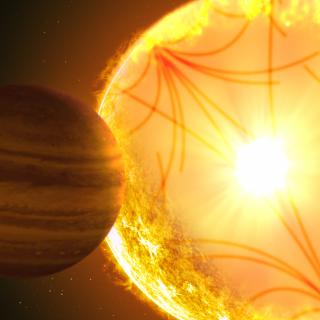Bibcode
Carpano, S.; Cabrera, J.; Alonso, R.; Barge, P.; Aigrain, S.; Almenara, J.-M.; Bordé, P.; Bouchy, F.; Carone, L.; Deeg, H. J.; de La Reza, R.; Deleuil, M.; Dvorak, R.; Erikson, A.; Fressin, F.; Fridlund, M.; Gondoin, P.; Guillot, T.; Hatzes, A.; Jorda, L.; Lammer, H.; Léger, A.; Llebaria, A.; Magain, P.; Moutou, C.; Ofir, A.; Ollivier, M.; Janot-Pacheco, E.; Pätzold, M.; Pont, F.; Queloz, D.; Rauer, H.; Régulo, C.; Renner, S.; Rouan, D.; Samuel, B.; Schneider, J.; Wuchterl, G.
Referencia bibliográfica
Astronomy and Astrophysics, Volume 506, Issue 1, 2009, pp.491-500
Fecha de publicación:
10
2009
Revista
Número de citas
40
Número de citas referidas
34
Descripción
Context: CoRoT is a pioneering space mission devoted to the analysis of
stellar variability and the photometric detection of extrasolar planets.
Aims: We present the list of planetary transit candidates detected
in the first field observed by CoRoT, IRa01, the initial run toward the
Galactic anticenter, which lasted for 60 days. Methods: We
analysed 3898 sources in the coloured bands and 5974 in the
monochromatic band. Instrumental noise and stellar variability were
taken into account using detrending tools before applying various
transit search algorithms. Results: Fifty sources were classified
as planetary transit candidates and the most reliable 40 detections were
declared targets for follow-up ground-based observations. Two of these
targets have so far been confirmed as planets, CoRoT-1b and CoRoT-4b,
for which a complete characterization and specific studies were
performed.
The CoRoT space mission, launched on December 27th 2006,
has been developed and is operated by CNES, with contributions from
Austria, Belgium, Brazil, ESA,
Germany, and Spain. Four
French laboratories associated with the CNRS (LESIA, LAM, IAS ,OMP)
collaborate with CNES on the satellite development.
First CoRoT data are available to the public from the CoRoT archive:
http://idoc-corot.ias.u-psud.fr.
Proyectos relacionados

Sismología Solar y Estelar y Búsqueda de Exoplanetas
Los objetivos principales de este proyecto son: 1) estudiar la estructura y la dinámica del interior solar, 2) ampliar este estudio a otros tipos de estrellas y 3) buqueda de planetas extrasolares utilizando métodos fotométricos y su caracterización con información complementaria (espectrometría). Para alcanzar el primer objetivo, utilizamos la
Savita
Mathur